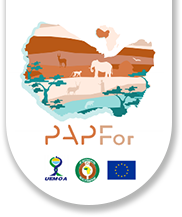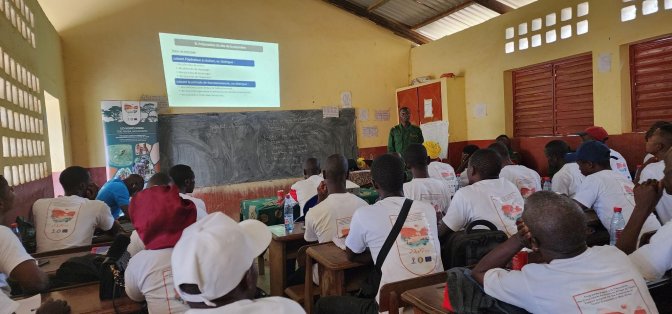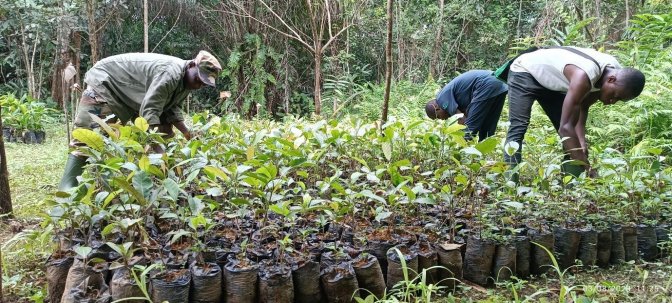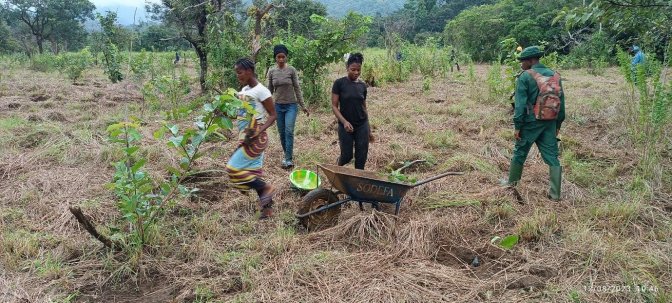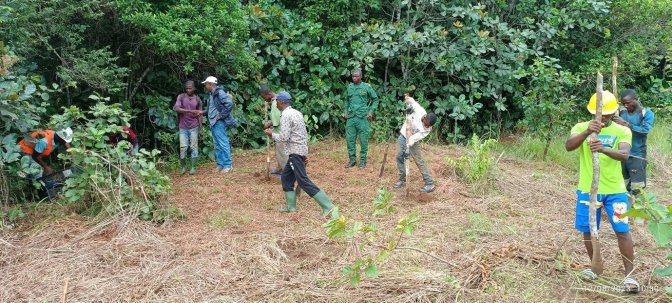Home / News / Reforestation of degraded critical sites in Mount Nimba’s Seringbara and (...)
Reforestation of degraded critical sites in Mount Nimba’s Seringbara and Nyon sectors (Guinea)
On 11 August 2023, the United Nations Office for Project Services (UNOPS) with support from EU-PAPFor organised the first reforestation exercise in the rural communities of Bossou in Guinea. The communities benefiting from the activity are Seringbara and Nyon, with the contribution of the Village Supervisory Committee (VSC) set up by the Centre for Environmental Management of the Nimba and Simandou Mountains (CEGENS), supported by UNOPS. The VSC liaises between CEGENS and neighbouring communities, providing support with monitoring and awareness-raising activities.
The aim of the exercise is to reforest the degraded natural area between the Gban de Bossou (chimpanzee hill) and the World Heritage Site of Mount Nimba Nature Reserve (on the Séringbara-Nyon side) to serve as a migration corridor for Bossou’s chimpanzees.
The reforestation activities began with awareness-raising sessions for local populations in the villages of Thuo, Bossou and Seringbara, organised by the VSC. These took place over three days. The VSC developed themes related to the consequences of deforestation and climate change by organising dance and theatrical performances.
Thirty members of the VSC in Thuo were trained in how to maintain and preserve critical reforested sites using a theatrical play ‘Respect for the Boundaries of Central Areas’. The training module was prepared and delivered by the Chief Conservator of CEGENS, Maoro Zoumaningui.
“The VSC are now able to master the techniques of setting up a nursery and transplanting and monitoring selected seedlings,” said Mariama Sy, UNOPS Communication Officer. Another group of VSC members was trained in Séringbara in the rural community of Bossou.
In a second phase, consultation meetings were organised to facilitate reforestation activities with the VSC, communities and stakeholders of the Nimba Mountains Biosphere Reserve. A total of 1 700 species of plants were produced in the nurseries, including Harungana madagascariensis (565), Uapaca guineensis (565), and Terminalia superba (575), plants which provide rich fodder for cattle, whose leaves are medicinal and fruits edible.
Also in August 2023, the VSC accompanied by the forest-edged communities proceeded to dig and place stakes on the reforestation site. Justin Bilivogui, CEO of CEGENS, and his team and Yacouba Magagi, PAPFor/UNOPS project leader in the Mount Nimba landscape, and his team were also present.
Reforestation is important because it maintains the balance of the environment. Reports of degraded areas of the Mount Nimba Nature Reserve had led to a series of field patrols and the data was analysed in order to decide how to protect the reserve effectively. The degradation was mainly due to human activities as well as, to a lesser value, natural cycles.
“Whatever the reason, it is always necessary to plan to recover from the damage. We should put the recovery of degraded forests at the top of our agenda,” said Yacouba Magagi, PAPFor / UNOPS project leader.
The planting of seedlings was well conducted by participants.
